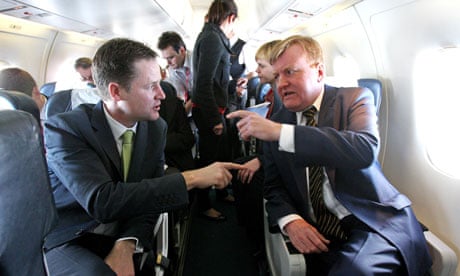The ghost of Joe Chamberlain may not be omnipresent as Liberal Democrats gather in his native Birmingham today, doubtless to endorse their leadership's new coalition government with the Conservatives, but his political shadow should be just perceptible nonetheless.
As someone who has always inclined towards reading the history book in preference to gazing into the crystal ball, I feel it is worth recalling that great statesman who split the political family and ended up as a Liberal Unionist. Several decades later and a similar trick was to lead to the emergence of the National Liberals and their subsequent assimilation within the Conservative fold. Can history repeat itself yet again?
Early returns from our rank and file would appear comforting; there seems to have been no instantaneous haemorrhaging of membership or a sudden direct flight into party affiliation elsewhere (despite opportunistic overtures from Labour). The resilience of our grassroots to drama at the top has been well tested over the years – from the birth pangs of the merger of the SDP and the Liberals through to our two changes of leader (three if Vince Cable's interim stint is included) over the course of the last parliament alone. This party takes the internally unexpected well. The reassurance contained within the superbly negotiated coalition agreement details obviously has played a positive role. All well and good.
Yet we have to be alert to the ease with which the new prime minister, at that opening joint press conference, referred to this "Liberal Conservative" government (having not seen the official transcript I am assuming the capital "L"). He's been here often before: from the early days of his leadership he was happy to describe himself as a "liberal Conservative". And we know he dislikes the term Tory. These ongoing efforts at appropriation are going to have to be watched.
With uncharacteristic understatement, Paddy Ashdown described last week's events as "a rather unexpected moment". Certainly, they drive a strategic coach and horses through the long-nurtured "realignment of the centre-left" to which leaders in the Liberal tradition, this one included, have all subscribed since the Jo Grimond era. It is hardly surprising that, for some of us at least, our political compass currently feels confused. And that really encapsulates the reasons why I felt personally unable to vote for this outcome when it was presented to Liberal Democrat parliamentarians.
Indeed, as someone drawn into the SDP, having abandoned Labour, I can but reflect on how two politicians up until now – David Owen and Tony Blair – have led to a scattering of the original Gang of Four's followers across the political spectrum. In the period after the merger an Owenite grouping ended up being welcomed into the Tory party by Chris Patten; others were to make their way into New Labour. For those of us who stuck with the Liberal Democrats this latest upheaval represents a further test of strategic mettle.
Like many others I was keen to explore the possibilities of a so-called "progressive coalition", despite all the obvious difficulties and drawbacks. It remains a matter of profound disappointment that there was insufficient reciprocal will within the Labour party – and they should not be allowed to pose in opposition purity as a result. We shall have to observe their leadership machinations from the sidelines – but it is important that both the process and the personalities involved use that exercise to think aloud and imaginatively about the opportunities that a national debate on electoral reform now presents. I am not yet holding my breath.
I did not subscribe to the view that remaining in opposition ourselves, while extending responsible "confidence and supply" requirements to a minority Tory administration, was tantamount to a "do nothing" response. I felt that such a course of action would have enabled us to maintain a momentum in opposition, while Labour turned inwards. But the understandable anxiety among colleagues about an early second election scuppered that option. To which might be added the significant reality of devolved general elections in just less than a year's time in both Scotland and Wales.
So now we must look to a centre-right government to deliver the appetising menu of liberal measures contained within the coalition agreement. In so doing the wider, non-governmental sections of the party – inside and outside parliament – will have a continuing family responsibility to help articulate values and a vision that underpins what our colleagues are seeking to enact in ministerial office. We must not forget that the real political personality of this administration, the one that will evolve steadily in people's minds over months and years, will be driven as much by reflex reactions to unexpected events as by carefully negotiated, pre-planned, legislative intent. So there will have to remain room for everyone.
My own political mentor, the late Roy Jenkins, once delivered a none too coded warning to the Owenites about the dangers of "a right, tight little party". I do not believe for one moment that is where the Liberal Democrats are headed. Roy, coincidentally, was another statesman with a Birmingham constituency base for the bulk of his career. It is his flame which I trust will continue to burn brightly there today.
Charles Kennedy, MP for Ross, Skye and Inverness West, was the Liberal Democrat leader from 1999 to 2006
